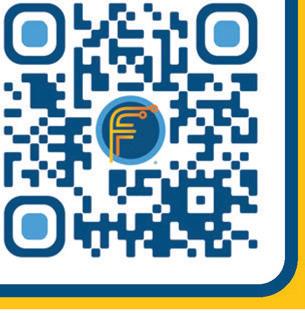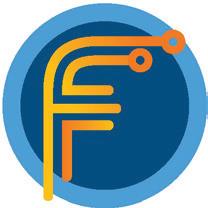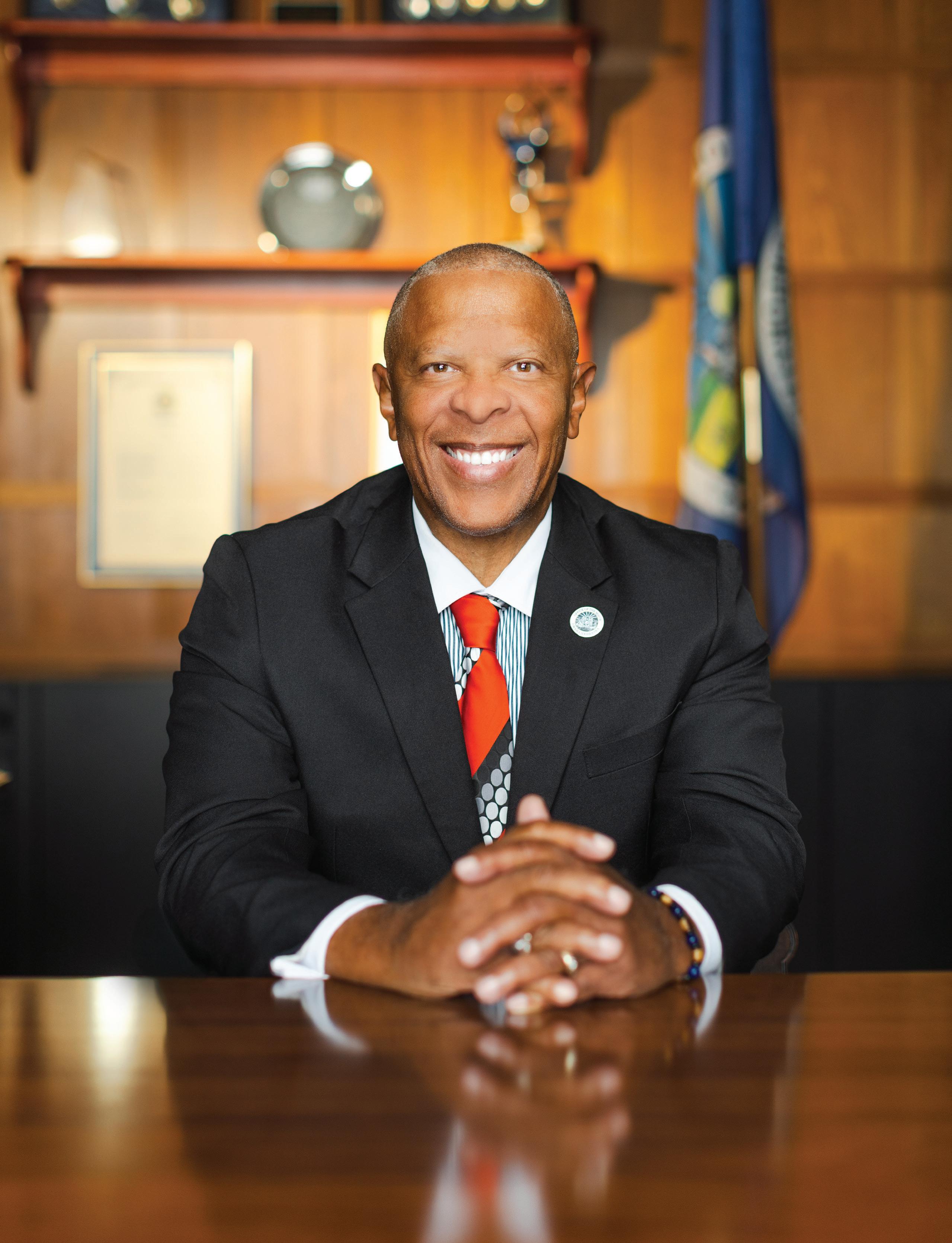

NORTH OMAHA FIRST
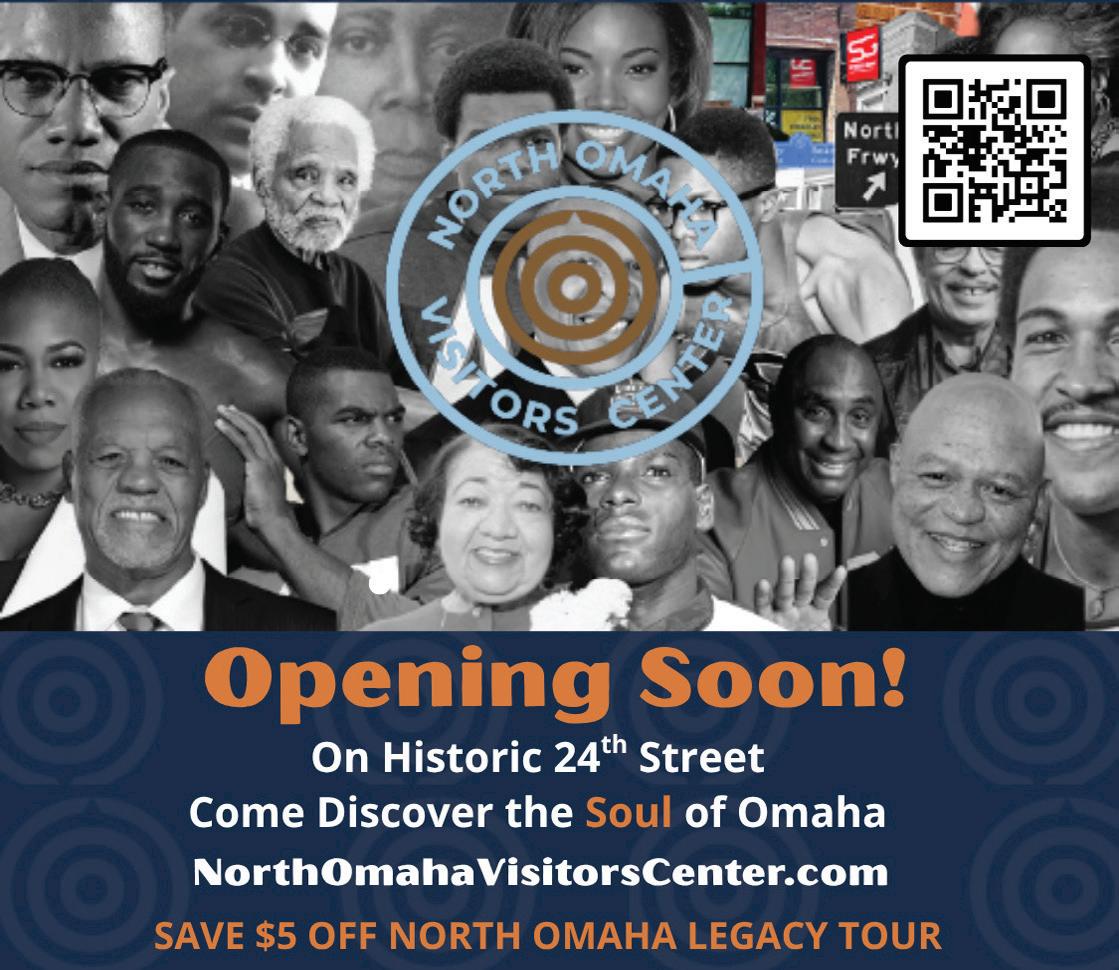



North Omaha Business Spotlight
Want to promote your business in our next edition? Scan the QR code to submit your application!




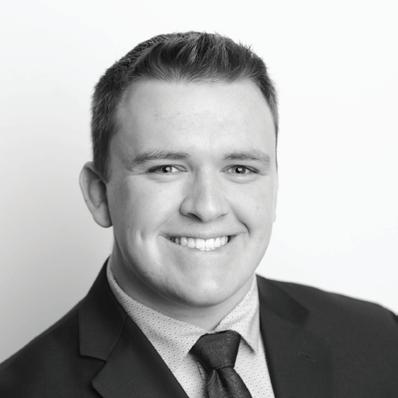
Letter from the Editor
Quiet Heroes, Loud Impact
Giving comes in many forms. Sometimes, it’s quiet, like a neighbor lending their internet access so the kids next door can finish their homework. Sometimes, it’s loud, like a nonprofit feeding thousands of families. And sometimes, it’s personal, like one man giving so much of himself to others that he loses everything—except his purpose.
In North Omaha, giving isn’t a trend. It’s a culture. In this issue, you’ll see it at work in people who show up, not because it’s easy, but because it matters.
That includes Omaha’s new mayor, John Ewing, whose leadership is as rooted in his personal experience as it is in policy. In our exclusive interview, Ewing outlines a bold and thoughtful vision for North Omaha, prioritizing long-term investment, equity, and opportunity for all. His story is a reflection of the kind of grounded, local leadership this community has always cultivated and supported.
You’ll meet Marlon Taylor, who started his Kindness Destroys Hate movement with just a few sandwiches, a message, and a heart for his neighborhood. In the process of expanding to a larger operation with several tables of items for those in need, he poured everything he had into spreading love and unity—so much that he lost his house along the way. Even that didn’t stop him. His story is the kind of quiet heroism this community is built on.
You’ll also get to know Talia McGill, the new CEO of No More Empty Pots. She’s part of a rising wave of nonprofit leadership in Omaha. Under her watch, No More Empty Pots is growing fast, with programs aimed at food access, entrepreneurship, and education. Like so many others in this issue, her work is a reminder that service doesn’t mean standing still.
That forward motion is also what drives Project Hope, where a staff with steady hands and open hearts serves more than 20,000 people a year. No headlines. Just impact. Every day.
This fall issue also marks a proud moment for FiberFirst. Recently recognized at the Omaha Chamber’s Business Excellence Awards for its philanthropy, FiberFirst continues to invest not only in the digital infrastructure of North Omaha, but in the people who make this place strong. From free internet access to support nonprofits, to hands-on STEM events in local schools, their mission is about connection in every sense of the word.
Giving in North Omaha isn’t performative. It’s personal and deeply rooted. It’s built on a long-standing belief that progress is possible when people look out for one another. The stories in this issue serve as a reminder: this community moves forward by lifting others with it.
North Omaha has never lacked for stories worth telling. Thanks for giving them your attention!
Isaac Nielsen
Managing Editor
North Omaha First
LEADERS
About the Cover
Born and raised in North Omaha, new Mayor John Ewing is bringing the community to the forefront of his vision. Story on page 8. SPORTS
Business

Managing
People First: KINDNESS DESTROYS HATE
The Man Who Wouldn’t Stop Giving
the summer of 2020, Marlon Taylor was supposed to be performing in cities across Europe. A hiphop artist of 26 years, he was on his second international tour when the pandemic shut down travel. He returned home to Omaha just as the country erupted in protests following the death of George Floyd. Living in Downtown Omaha, Taylor saw it all up close—marches, broken windows, shouting, and pain.
“I wanted to figure out something that I could do with my time to change the atmosphere of Downtown Omaha in that time period,” Taylor said. “I didn’t have a lot, but I knew that I could afford to make sandwiches and give them out.”
That was the start of Kindness Destroys Hate.
Each day, starting June 11, 2020, Taylor set up in the Old Market with lunches: a sandwich—PB&J or ham and cheese— chips, a piece of fruit, cookies, and a bottle of cold water.
“I would stand there and give them out all day to anyone who passed me,” he said. “It wasn’t about Black or white. It wasn’t about old or young. It wasn’t about rich or poor.”
People took notice. One woman stopped by his apartment and dropped off a garbage bag filled with 50 pairs of tennis shoes. Another brought bags of clothes. One day, he was given 500 diapers. His two folding tables turned into a daily pop-up of generosity—lunches, shoes, clothes, whatever people needed.
To unify the small group of volunteers who occasionally helped, Taylor printed 30 t-shirts with his campaign name: Kindness Destroys Hate. He only ever had six volunteers wear them. The rest sat in a box until one of his social media followers asked if they could buy one. “Someone said, ‘I’ll take one of these, here’s 20 bucks,’” Taylor recalled.
Story by Isaac Nielsen
by Sarah Lemke
I wanted to figure out something that I could do with my time to change the atmosphere of Downtown Omaha in that time period. I didn’t have a lot, but I knew that I could afford to make sandwiches and give them out.
– Marlon Taylor
That small box of shirts became his fundraising engine, as he used the money raised to purchase groceries to make more lunches. When KETV profiled him in a Thanksgiving segment, the next morning—Black Friday—he arrived downtown to a line two blocks long. By the end of the day, he’d sold $10,000 in shirts and hoodies.
And he didn’t keep a dime. “I took that $10,000 and turned it into everything that I could think to turn it into,” he said.
He bought out every heater on the shelf at Walmart and passed them out on the street. He gave away 61 laptops to kids in Omaha and Council Bluffs. He posted online asking for stories about families in need, chose five that touched his heart, and gave each $500. He even inspired a friend in Maryland to start a boxed meal program of her own.
That December, he turned his house into Santa’s Workshop. He spent thousands on toys, and others joined in with donations. Any family—no matter their background—could come pick out a gift for their children.
He continued into the summer, buying $600 worth of summer passes for swimming pools in Council Bluffs. He asked again for stories of kids “doing good” in their community or in school, and picked 20 to give passes to.
But while Taylor gave relentlessly, his own stability began to unravel.
“During 2020 and 2021, there was a lot of money floating around,” Taylor said. “There were a lot of stimulus checks, and, for the most part, people were getting by because there was money floating around. That helped me because people were taking it and using it to help my organization. But in 2022, things started changing again, and money became tighter. People started having to make choices, like, ‘Do I want to buy gas or do I want to buy eggs?’ And when you have that kind of economic situation, buying hoodies and shirts from Marlon becomes less of an option.”
He stretched every dollar as far as he could, but by July 2023, Taylor lost his home. For the next 18 months, the man known for giving to strangers lived in and out of hotels. Still, he didn’t stop.
Finally, in September 2024, thanks to the generosity of “beautiful people,” Taylor was able to move into an apartment in Bellevue. Now, five years into the “Kindness Destroys Hate” movement, he’s still going largely on his own, with no end in sight. “I just want to keep helping my community,” Taylor said. “I don’t have a main goal that I want to do with my program. My program is perpetual, so I’m never going to stop helping people.”

Photography
Scan to learn more about the “Kindness Destroys Hate” movement

Marlon Taylor
Sports First: BLACK AND GOLD DREAMS
Darion Jones Charts His Own Path
the time fireworks lit up the sky on July 4, Darion Jones had already set off a spark of his own.
The three-star cornerback from Omaha North announced his commitment to the University of Iowa, fulfilling a childhood dream and launching the next chapter of his football journey.
Jones had been a lifelong fan of the Hawkeyes, growing up watching Iowa games on TV and imagining himself in black and gold. So when the opportunity to make it a reality finally came, it felt right.
“Committing there after seeing it was such a great feeling,” Jones said. “It’s really felt like home for my whole life, since watching it on TV. It just shows that dreams can come true, and if you work hard enough, you can get there.”
While the fact that Jones had already been a fan undoubtedly made the process easier, it was the consistency and connection from Iowa’s coaching staff that made the biggest impression. After early conversations turned into regular contact, Iowa coaches began attending his track meets, calling his parents, and opening the program’s doors.
Jones said the decision came into full focus during his official visit. On the final day, he and his parents sat down with longtime defensive coordinator Phil Parker. As Parker walked through his coaching process and philosophy, something clicked.
“I was like, ‘Yeah, I’m going to go here, because I think he’s going to take me places that I want to go,’” he recalled. Jones, who enters his senior season with high expectations, has built a reputation as a playmaker in the secondary. He prides himself on his ability to go up for contested balls and come down with them, which he believes will translate well to the next level.
Story by Isaac Nielsen
Photography by Sarah Lemke
It just shows that dreams can come true, and if you work hard enough, you can get there. –Darion Jones
While Jones is confident in his strengths, he’s also focused on refining his technique, particularly staying square in press coverage—something he’s spent the offseason working on during training stints in Dallas and Fort Worth.
While his personal goals are lofty—to improve on last year’s stellar performance and to be named Nebraska’s Gatorade Player of the Year—his biggest goal is to win a state championship with Omaha North this season.
Jones doesn’t take his roots lightly. He said the work ethic and community instilled in him by Omaha North, and OPS as a whole, played a major role in his journey.
“My dad’s been working for OPS for a long time, so I grew up around it,” Jones said. “So I think being OPS strong is a big thing. Things don’t come out of nowhere here. You have to put in the work here. To really work and represent, it means a lot to me.”
More than chasing personal success, Jones wants to leave something lasting. For him, it’s about legacy: setting a standard at North High that others can look up to. That means leading by example.
“I want to leave a big legacy here at North, because I know there’ll be some kids coming through here looking up to people,” he said. “I want to leave a big legacy because it’s a place that means a lot to me, and I want to show that people, even from North, can go to the big stage.”
Jones’ commitment announcement was a family affair, held with loved ones gathered around to celebrate, including his older brother, Donovan—a redshirt freshman defensive back at Nebraska. After Darion made it official, the moment turned symbolic: a split Iowa-Nebraska flag was raised. Donovan threw the bones in a nod to his team, while their dad proudly held a childhood pho -
to of the two brothers—Darion in an Iowa jersey, Donovan in a Nebraska one.
“I always looked up to my brother, even though his journey was a lot different from mine,” Darion said. “He always said, since the beginning, that he didn’t care where I went. He told me to go somewhere where I felt like it was home, where I could play, and where it was the right place to be.”
Though he never felt pressure to follow Donovan to Lincoln, Darion did feel the weight of expectations at Omaha North after his brother’s departure. Already one of the top athletes in the state, he now had to pave his own path.
“Especially this last year, when he left, that was my junior year, and everyone expected me to be like my brother and be better,” Jones said. “I’m still trying to get out of that shadow.”
That dynamic will be front and center once again when Iowa and Nebraska square off. And while the rivalry adds another layer to their relationship, it’s also a return to familiar ground. During their time at North, the brothers regularly battled in practice.
“When I was a freshman and sophomore, I was always on scout team, so when he was on offense, I was on defense, and when he was on defense, I was on offense,” Jones said. “We were always used to playing each other every day in practice. It’s just like that again. I can’t wait.”
Asked who would win in a one-on-one matchup if he lined up at wide receiver against Donovan, Darion smiled.
“I think I might get him.”
So, if we check back in five years, what does Darion hope we’re talking about?
“The NFL Draft,” he said. “That’s the dream right there.”
Darion Jones
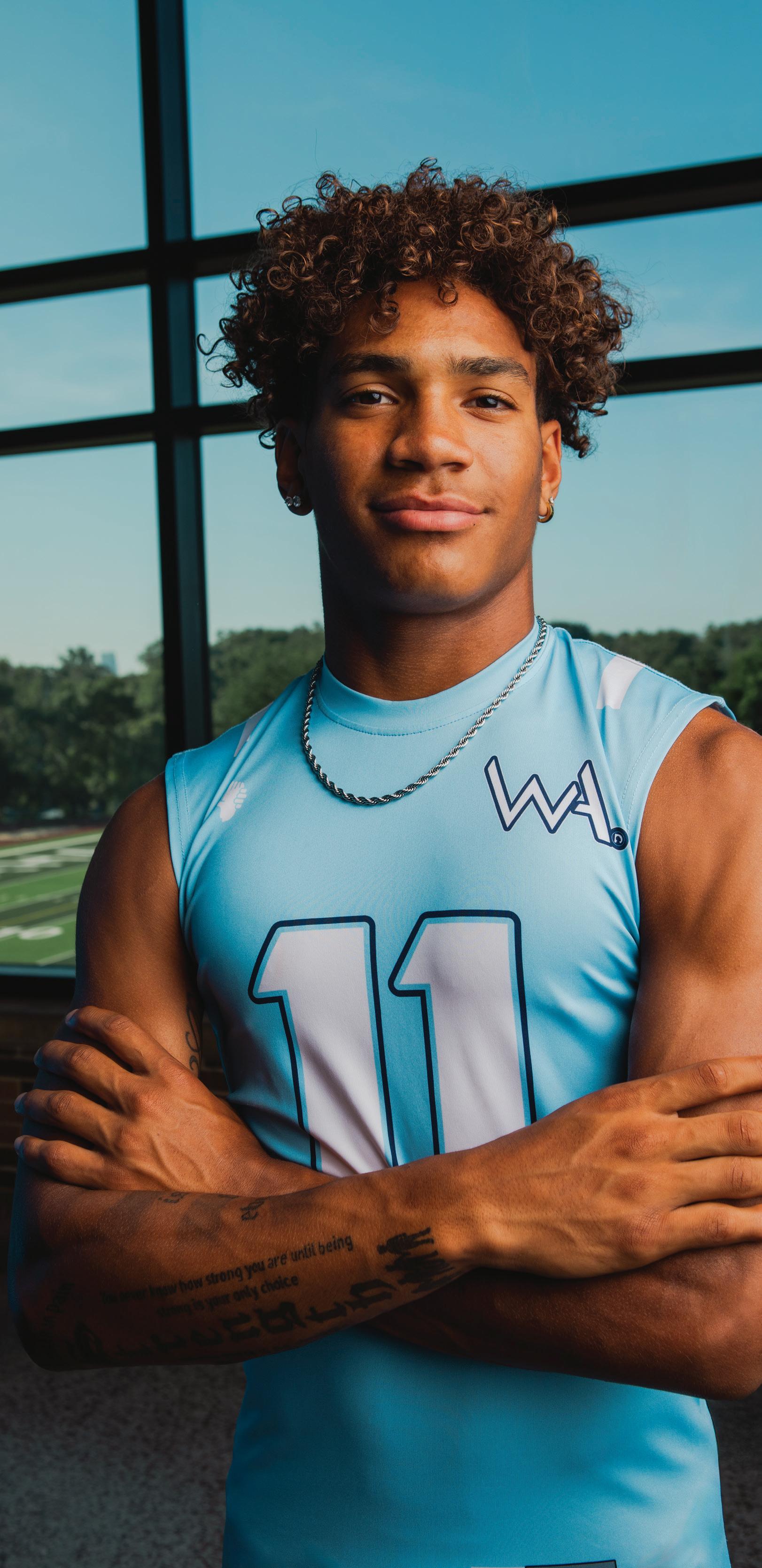
Project Game ON to Transform North Omaha by 2027
Story by Isaac Nielsen Rendering
courtesy of
Alley Poyner Macchietto Architecture
Big changes are coming to 34th and Ames. In summer 2027, North Omaha will see the grand opening of Project Game ON: a new stadium for Omaha North High and a brand-new YMCA to replace the aging Butler-Gast branch.
For years, North High students have played “home” games all over the city. That’s finally changing. The new on-campus stadium will give athletes, band members, JROTC, and drill and step teams a true home field right in the heart of the neighborhood. With seating, locker rooms, concessions, and real restrooms, the space will be built for both players and fans. The old east-side field will stay, too, giving students another place to practice and train.
Next door, the Butler-Gast YMCA will be torn down and rebuilt from the ground up. The new facility will have a gym, fitness center, pool, child care, and meeting rooms—all designed to support families and neighbors of all ages.
This project doesn’t displace homes, and current YMCA members can still use other locations during construction. Backed by state funds and community foundations, Project Game ON is a long-overdue investment in North Omaha’s youth, health, and pride.
www.projectgameon.org
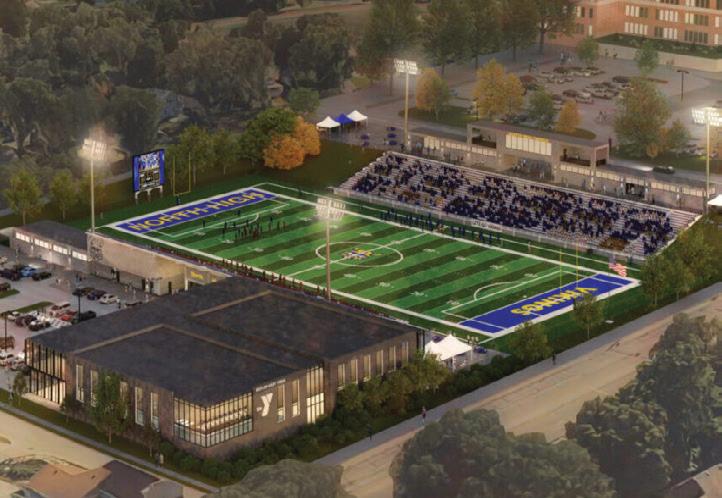

To learn more about Project GameON, scan the QR Code.
Rendering of the new Project Game ON stadium, set to open in summer 2027.
Leaders First: TURNING NORTH
Story by Isaac Nielsen // Photography by Bill Sitzmann
Mayor John Ewing’s Vision for North Omaha
hen John Ewing was sworn in as the first Black mayor of Omaha on June 9, it wasn’t just a political win for the former Douglas County Treasurer. It was personal for the community that helped carry him there. Ewing’s victory followed a race that drew national attention, but in North Omaha, it reflected that the region finally had a seat at the table.
Ewing didn’t just scrape by. In District 2, which includes much of North Omaha, he received over 82% of the vote, a clear sign of trust from voters in that part of the city. Now, a few months into the job, Ewing is learning the pace and pressure of the office.
Despite the strong local support, the new mayor said he was taken aback by the widespread attention the race for the office attracted beyond Omaha. “The biggest thing that has surprised me is the amount of interest in this race and me being mayor from the nation and locally,” he said.
That interest began long before election day. The race was marked by its intensity, with community organizing efforts across Omaha and a wide range of issues shaping the debate. But for Ewing, campaigning came on top of other responsibilities.
“The average person doesn’t see the energy it takes and the amount of stamina you have to have, as you’re going through three or four events a day, television interviews, trying to reach out to members of the community for support that you might need,” he said, “while also trying to do my job as the Douglas County Treasurer. I had to be the treasurer for the people who elected me to that office.”
Throughout the campaign, Ewing focused much of his messaging on North Omaha and its surrounding communities. That included a pointed effort to continue building relationships with the religious community in North Omaha.
“That was an area of focus for us,” Ewing said of North Omaha. “Another area of focus closely related to that was Black
We need to make sure that we are comprehensive in developing North Omaha where [residents] can live, work, and play...so that they have access to the basic necessities of life.
–Mayor John Ewing
churches. Both my wife and I are associate ministers at Salem Baptist Church, so we felt that would be the coalition we would be able to count on.”
Ewing said many voters told him they had seen him present in the community over the years, well before he launched his mayoral bid.
“People understood that I was not just coming around because it was election time, but that I had been involved in the community and served the community well,” he said.
That long-standing presence is something Ewing hopes will serve him well in office. His early priorities echo campaign themes that resonated with many North Omaha residents: economic development, more inclusive decision-making, and neighborhood infrastructure.
“One of the things I talked about in this campaign everywhere I went was the opportunity to actually be able to expand economic development and be intentional about economic development in North and South Omaha,” he said, “where we would be able to create more jobs in North Omaha and give people the opportunity to participate in the good life in Omaha.”
Ewing has emphasized the need for economic planning that addresses disparities across neighborhoods. He said new investments should be tied to longterm improvements for communities that haven’t historically seen equal levels of development.
He also outlined his approach to neighborhood development in Omaha, which focuses on improving quality of life and economic situations of residents.
“We need to make sure that we are comprehensive in developing North Omaha where [residents] can live, work, and play in the neighborhood, so that they have access to the basic necessities of life,” Ewing said. “That’s grocery stores so that we don’t have food deserts, that’s walking trails, that’s health care—I think all of those things make for a great community.”
Ewing pointed out that these improvements could have economic ripple effects as well. With more amenities and services located directly in the neighborhood, more dollars could circulate locally.
“By having those things in the community and having people spend some of their earnings in the community, then those dollars turn over in the community, and you have more of an opportunity to have an economic engine in North Omaha,” he said.
He also acknowledged that representation matters, not just in policy, but in the people who help shape it.
“We have to be more inclusive in appointing people to boards and commissions and things like that that are part of the decision-making process for the city of Omaha,” Ewing said. “We also have to do a great job of having town halls and other opportunities for people to be able to share their thoughts with leaders in city government.”
When asked about specific goals, Ewing pointed to issues that remain front-ofmind for many residents: food access, public health, and infrastructure that supports a better daily life.
continued on pg. 11
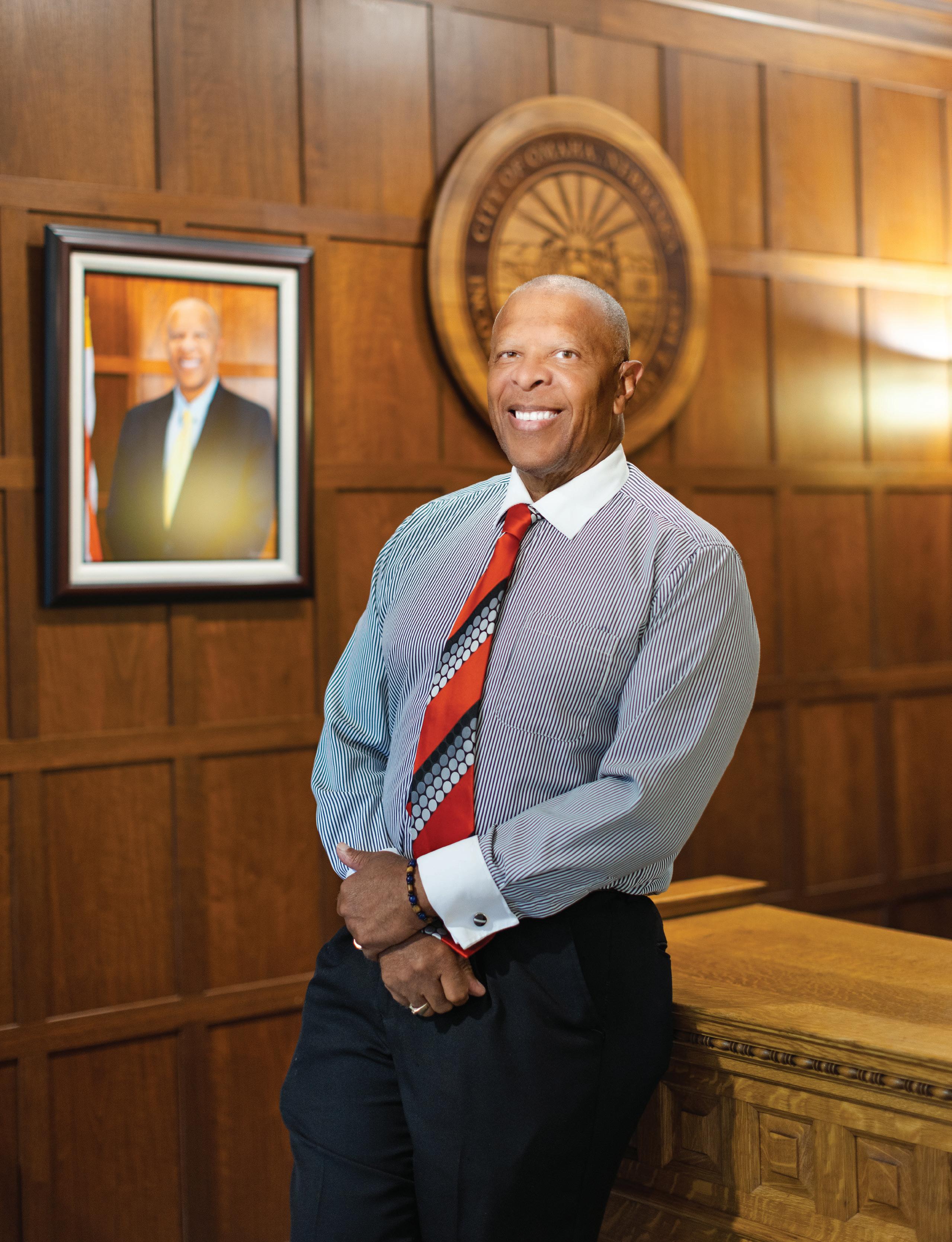
I’m truly grateful to be able to serve as mayor. I know that the hopes and dreams of a lot of people rest on my shoulders, and I will never take that lightly. I will do everything I can to ensure that we have an amazing North Omaha as part of this very vibrant city. –Mayor John Ewing
Fun First: ACTIVITIES / EVENTS AROUND NORTH OMAHA
Event information is correct as of presstime. Details are subject to change, please check the official websites as provided.
HANDMADE PARADE
Sept. 27
Benson Historical Downtown, 6068 Maple St.
The Handmade Parade is Omaha’s celebration of communal creativity and artistic expression, presented by BFF Omaha and the Benson Neighborhood Association. With the catchphrase, “unity through creativity,” the parade will feature costumes, unique masks, dances, and live music that are all crafted by community members and local artists, allowing them to use Benson Historical Downtown as a live exhibit for the art that has been created through the community. handmadeparade.org

Nominate a Teacher to Win $500
By nominating a teacher or educational support staff, you are honoring the impact of their dedication and positive contributions to education, their ability to motivate and inspire others, their innovative teaching methods and/or the positive influence they have on their students.
The teacher selected will win a $500 gift card and be featured in the next North Omaha First Magazine issue.
Scan here to start

Proud to recognize teachers in our community!
FUTURE IMPERFEKT
Oct. 16-19
Florence Community Theater, 2864 State St.
The Florentine Players and the Florence Community Theater are a nonprofit theater group that have been staging productions since 1964 as part of the Florence Historical Foundation. One of four productions per year, Future Imperfekt is their October production that will explore the themes of suspicion, hatred, and revenge. With a wide variety of characters, it’s sure to be a very melodramatic performance. florentineplayers.com

SEPTEMBER
THE MARCH ON WASHINGTON FOR JOBS & FREEDOM
Through Oct. 4
Great Plains Black History Museum 2221 N. 24th St. 402.932.7077 gpblackhistorymuseum.org
FLORENCE MILL FARMERS MARKET
Every Sunday through September
Florence Mill 9102 N. 30th St. 402.551.1233 www.localharvest.org
OMAHA RESTAURANT WEEK
Various Locations
Sept. 12-21 @omaharestaurantweek
ONE COMMUNITY CULTURAL FESTIVAL
Sept. 13-14
Gene Leahy Mall at The Riverfront 1001 Douglas St. www.onecommunityculturalfestival.com
THE FREE FARMERS MARKET: FOOD AND PRODUCE SWAP
Sept. 28
Floors, Floors, Floors 7052 Maple St.
OPENING: NORTH OMAHA VISITORS CENTER
2205 N. 24th St. 402.812.3324 northomahavisitorscenter.com
BFF BALL AND ART AUCTION
Nov. 14
BFF Gallery and Mercer Masonic Lodge, 5902-5903 Maple St.
In Omaha’s vibrant Benson Creative District, this annual gala is one of Omaha’s most extravagant fundraisers. Featuring an art auction that will showcase work from regional artists, the event will also include live music, performances, and a mystery theme that is sure to tie the whole event together. Fur coats, gowns, and all things glamorous are encouraged and even required for fitting into this niche Omaha scene.
bffomaha.org
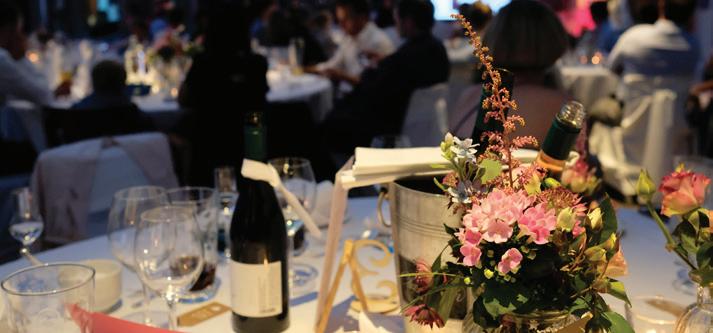
OCTOBER
NO MORE EMPTY POTS SUPPER CLUB
Oct. 4, Oct. 25
No More Empty Pots 8501 N. 30th St. awaugh@nmepomaha.org nmepomaha.org
ANGELS IN AMERICA PART TWO: PERESTROIKA
Oct. 10-Nov. 9
Omaha Community Playhouse 6915 Cass St. 402.553.0800 omahaplayhouse.com
FALL FEST IN THE VILLAGE
Oct. 11
24th & Ohio to 24th & Lake 402.502.5153 allevents.in
TRUNK OR TREAT
Oct. 18
Florence City Hall 2884 State St. florentineplayers.com
THE FREE FARMERS MARKET: FOOD AND PRODUCE SWAP
Oct. 26
Floors, Floors, Floors 7052 Maple St.
HALLOWEEN ON THE BOOLEVARD
Oct. 31
Minne Lusa Blvd. millerparkminnelusa@gmail.com mpml.org
NOVEMBER
FREE FAMILY NIGHT
Nov. 14
Union for Contemporary Arts 2423 N. 24th St. 402.933.3161 info@u-ca.org U-ca.org
2025 GRATITUDE GALA AND AWARDS
Nov. 22
Midlands African Chamber Metropolitan Community College—Fort Omaha Campus 5300 N. 30th St. midlandsafricanchamber.com
OMAHA HOLIDAY LIGHTS FESTIVAL
Nov. 29—Jan. 1 Around 24th and Lake streets holidaylightsfestival.org
VETERANS DAY CELEBRATING AFRICAN AMERICANS WHO SERVED
Nov. 11
Great Plains Black History Museum 2221 N. 24th St. 402.932.7077 gpblackhistorymuseum.org
BREAKFAST WITH SANTA
Nov. 22
Florence City Hall 2884 State St. florentineplayers.com
“I want to start to eliminate food deserts,” he said. “I think that’s one of the critical issues facing our community in a number of places—where we don’t have ready access for the people of our community when it comes to being able to buy healthy fruits and vegetables and things of that nature.”
He also wants to see more walking trails and health-oriented infrastructure in underserved areas. “We could make physical and mental well-being a big part of everyone’s everyday life,” he said.
Looking at the remainder of his term, Ewing identified the city’s planned business park and innovation hub as key tools to address structural challenges tied to poverty. “In the next four years, I really want to see us do a great job with the business park and the innovation hub,” he said. “Because that will help us be able to address some systemic issues in Omaha that have led to unnecessarily high rates of poverty. We can also begin to look at comprehensive approaches to more affordable housing.”
While there will certainly be tangible metrics to measure Ewing’s success, he said his vision of success will come from his constituents. “Success, for me, would look like people in the community being happy with the level of the city services that they’re getting in North Omaha, great partnerships with our public safety people in the police and fire departments, and also further economic development,” he said.
Ewing offered a message to North Omaha residents who backed his candidacy. “I just want to say thank you to the people of North Omaha who turned out to vote and who supported me in this effort,” he said. “Because I’m truly grateful to be able to serve as mayor. I know that the hopes and dreams of a lot of people rest on my shoulders, and I will never take that lightly. I will do everything I can to ensure that we have an amazing North Omaha as part of this very vibrant city.”
As Ewing begins his first term, the promises of his campaign are being weighed against the practical challenges of governing a growing, divided city. For North Omaha residents, many of whom have waited decades for meaningful investment, the next year may offer early signals of how much—and how quickly— the new administration can deliver.

To contact the Mayor’s Hotline with questions, comments, or concerns, scan here.
Nonprofits First: MEETING THE NEED
Story by Natalie Veloso // Photography by Sarah Lemke
Project Hope Serves North Omaha with Compassion
hings rarely slow down at Project Hope’s North Omaha location on 60th and Hartman streets, but steady hands and open hearts keep things moving.
Volunteers sort fresh produce, label bags of rice, and guide neighbors through racks of gently used seasonal clothing. Some unpack donations. Others register clients or load boxes into cars. All of it is done with a shared mission: helping neighbors, improving lives, and spreading blessings.
“We are called to feed and clothe God’s people in need,” said Veda Keebler, Executive Director of Project Hope. “We believe nutritious food contributes to good health, and we value people with love, hope, compassion, and dignity. That’s what drives what we do and who we serve in our area.”
Project Hope has been doing just that for 40 years. The organization first opened its food pantry in early 1986 and now operates at 6201 North 60th Street, with two additional satellite sites reaching families in South Omaha and West Omaha. While they serve the entire metro area—including greater Omaha and Council Bluffs—their North Omaha roots are central to their work.
“Based on zip codes, the majority of our clients here at this location come from North Omaha,” Keebler said. “We served over 6,000 families last year and more than 20,000 individuals, and that was an increase of more than 20% over the year before.”
That growth reflects both the persistent need in the community and Project Hope’s ability to rise to the occasion— though 2025 has brought new challenges.
“Last year, we were able to reach more people than ever by providing programs, food, and clothing for them,” Keebler said. “We were able to receive several grants that covered the amount of food we needed to purchase. We spent over $75,000 at local grocery stores and organizations to purchase food. This year, however, we’re struggling.”
We want those who come to Project Hope to know we care about them and want to help better their lives however possible. We want to give them hope. –Veda Keebler
Project Hope has yet to receive any food grants this year, putting strain on its ability to meet consistent demand. “We’re also not seeing a decrease in the number of families we’re serving. We continue to have large numbers of people here each pantry day,” Keebler said.
In addition to donated shelf-stable items, the pantry often purchases perishable essentials like milk, cheese, and meat— especially when they’re not provided by the Food Bank for the Heartland or other partners. Keebler noted high demand for items such as cereal, granola bars, canned fruit and vegetables, canned meats, and beans.
And it’s not just food.
“In addition to groceries and clothing items, we could use donations of size 5 and 6 diapers, Pull-Ups, small bottles of dish soap, small bottles of laundry detergent or pods, body wash, hand soap, shampoo, deodorant, toothpaste, and paper products such as facial tissue, paper towels, and toilet paper,” she said.
To keep all of these services running smoothly, the organization depends on a small but mighty volunteer team. “We have approximately 40 consistent volunteers, and they do a variety of different things,” Keebler said. The volunteer crew makes it possible for the pantry to operate with care and dignity, doing everything from registering new clients to stocking shelves, breaking down bulk goods, sorting clothing, and even delivering food.
“We could always use volunteers,” Keebler added, emphasizing the need for help in both the food and clothing pantries. Now offering expanded hours, the clothing pantry is open Monday, Wednesday, and Friday from 11 a.m. to 3 p.m.
Earlier this year, the nonprofit also made a key upgrade behind the scenes: switching their internet and phone services to FiberFirst. “We went to FiberFirst because of the faster internet speed,” Keebler said. “We’re seeing that our internet is fast and not being dropped. We’ve been able to register our clients more easily, too.”
Before the upgrade, volunteers often had to rely on their own phone hotspots to process client registrations. “Now, we’re not having to do that. It’s extremely helpful for efficiency to have that technology and speed to provide our services.” The reliability and compassion behind those services resonate with everyone who turns to Project Hope for help.
“I know sometimes people think we’re just giving them leftovers or things other people throw away, but that’s never the case,” Keebler said. “We make sure the food is as fresh as possible and is always good quality. We spend quite a bit of money trying to make sure we have a variety of foods to meet every need.”
The work goes beyond offering a box of food or a bag of clothing. It’s making sure no one faces it alone.
“We want those who come to Project Hope to know we care about them and want to help better their lives however possible,” Keebler said. “We want to give them hope.”

To support Project Hope with donations or to sign up as a volunteer, visit projecthopeomaha. org. To donate directly, scan the QR code below.
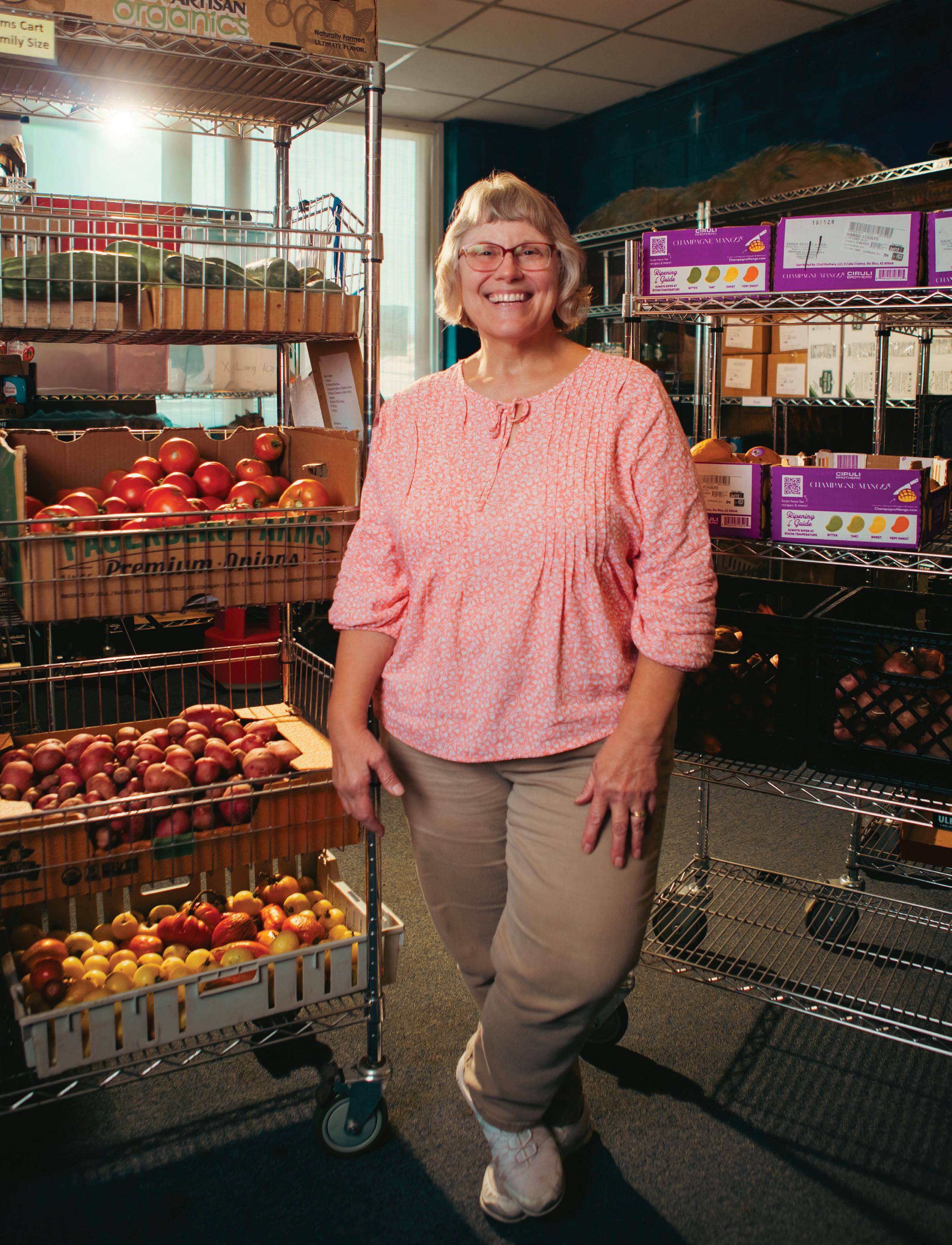
Veda Keebler
People First: THE NONPROFIT NINJA
Story by Isaac Nielsen // Photography by Sarah Lemke
Talia McGill Ushers in a New Era of Food Justice
hen Talia McGill stepped into the role of CEO at No More Empty Pots in December 2024, she wasn’t just taking over a nonprofit— she was stepping into a vision rooted in community and access.
“It’s big shoes to fill,” she said of succeeding co-founder Nancy Williams. “And I have different-sized feet.”
A self-described “nonprofit ninja,” McGill worked in the shadows of the North Omaha nonprofit for six years before assuming leadership of No More Empty Pots. The organization, which is dedicated to creating local, sustainable food systems, offers everything from culinary training to agriculture. The new CEO was initially drawn to the company through word-of-mouth.
“For me, having been a child in mostly a single-parent household, food was always kind of at the center of things,” McGill said. “Food is such a crucial part of our well-being, and not everybody has the same opportunity or the same access to the same quality of food that’s out there.”
Since taking the helm, McGill has led No More Empty Pots through a period of dramatic growth. The nonprofit has revamped and expanded its programs in that time and is finally recovering from the COVID-19 pandemic.
During the pandemic, it shifted to an emergency response state, McGill said, but never really reopened its doors in the same way they were before the shutdown. A cafe by No More Empty Pots in Florence was open for about four months before it was forced to close its doors due to the pandemic, and the community education team had been forced to shift to hybrid or virtual programming. But under McGill’s leadership, the cafe reopened in January, and No More Empty Pots now has a full schedule of workshops and activities for the general community.
While McGill’s short-term goal is to open more public programming, she’s
pleased with how successful her team has already become.
“In the year and a half that I’ve been in this role, we have increased our programming dramatically,” McGill said. “We took a really good look at some of our programs and revamped them, and they are showing improved outcomes. We’re showing increased funding again, and we’re seeing that the participants, after they get through our programs, are actually achieving their goals.”
For example, “we recently rolled out a business development course that some students enrolled in,” McGill said. “One of the students started a vegan business because she was always going to these family cookouts, and they would never have anything for her. She started making these cauliflower wings, and it took off. She decided, ‘I should start a business around this.’ Now, she’s getting ready to launch her business and it’s so exciting.”
McGill said the organization’s approach is what sets it apart. While many hunger-relief efforts focus on emergency food distribution, No More Empty Pots aims to address the roots of food insecurity.
“There are many ways that a person who is in need of food might get it, and there are methods for that, like pantries and emergency assistance, but No More Empty Pots is approaching it from a systems perspective—big-picture,” McGill said. “It’s not just about getting the food, it’s about knowing where your food comes from, knowing how to cook with the food, it’s more than just access.”
That big-picture thinking has shaped several recent initiatives, including a growing focus on food as medicine. McGill said the organization is working closely with healthcare agencies across the city to provide both food and education directly to patients and staff. They’re also in the process of getting their prepared meals service certified for purchase with Medicare and Medicaid.
“There is food. There is plenty of food,” she said. “But it’s not always getting where it needs to be when it needs to get there.”
There is plenty of food. But it’s not always getting where it needs to be when it needs to get there.
–Talia McGill
McGill pointed to issues like transportation, eligibility rules, and cultural mismatches as examples of gaps in the current food system—gaps No More Empty Pots is working to close. One person might only be able to carry what they can eat that day. Another might face a rule limiting their pantry visits to once a month. And still others might decline donated food if it doesn’t match their dietary needs or cultural traditions.
“The community appreciates our consideration for diversity and cultural differences,” she said. “With what someone can eat or have access to, we know that if it’s not culturally affirming, they still may not eat it and may still go hungry. We try to always expose people to a variety of different types of flavors and cultures, and make eating more than just a necessity, but an experience.”
While McGill had a variety of experiences—including a master’s degree in marketing—before taking the reins at No More Empty Pots, she said the most important preparation for her role came from her childhood—and the ballfield, having been a multi-sport athlete with a focus on softball growing up.
“In sports, you have a variety of players and everyone’s different. Everyone learns differently. Everyone moves differently and has different skills and abilities, but you all have one goal: you want to win the game.”
That team mindset has helped McGill navigate a changing nonprofit landscape. She’s part of a new generation of leadership for nonprofits in Omaha, taking the
baton from a wave of long-serving community figures who have stepped away from their roles in recent years. It’s a time of uncertainty, but also opportunity.
Her leadership style, she said, is grounded in three key values: innovation, authenticity, and growth.
“I want people to be authentic,” McGill said. “I am not the typical business-suit CEO. I learned early on in my career that if I didn’t have high-tops on, I probably wasn’t going to be productive. I encourage people to come as you are in a way that you can do your best work.”
That spirit of inclusion is reflected in the nonprofit’s intergenerational programming, which ranges from early childhood workshops to senior cooking classes.
“Teaching a 6-year-old is very different from teaching a young adult to cook, and very different from dealing with a senior who may be dealing with a loss of motor function,” McGill said. “We have a little bit of something for everyone.”
That includes fun, too. Over the next six months, the organization plans to host who-done-it mystery dinners and culinary capstone events open to the public, and launch a greenhouse project featuring over 100 buckets of hydroponic tomatoes.
And for those wondering how to support No More Empty Pots, McGill’s message is simple: show up.
“Supporting our work is really easy: just engage in activities,” she said. “Whether you come to a workshop or a class, if you have the opportunity to choose where you get your groceries from, stop by our store. If you’re looking for a new coffee shop, come by our cafe. It’s not always a donation—sometimes you can just include our services in your everyday decisions.”
At the heart of it all, McGill said, is a belief in what people deserve.
“My personal ‘why’ that keeps me grounded in this work is just that I think people deserve it,” she said. “Being healthy, eating healthy, or just having the option to choose what you want is for everybody. It doesn’t matter where you come from—everybody has to eat.”

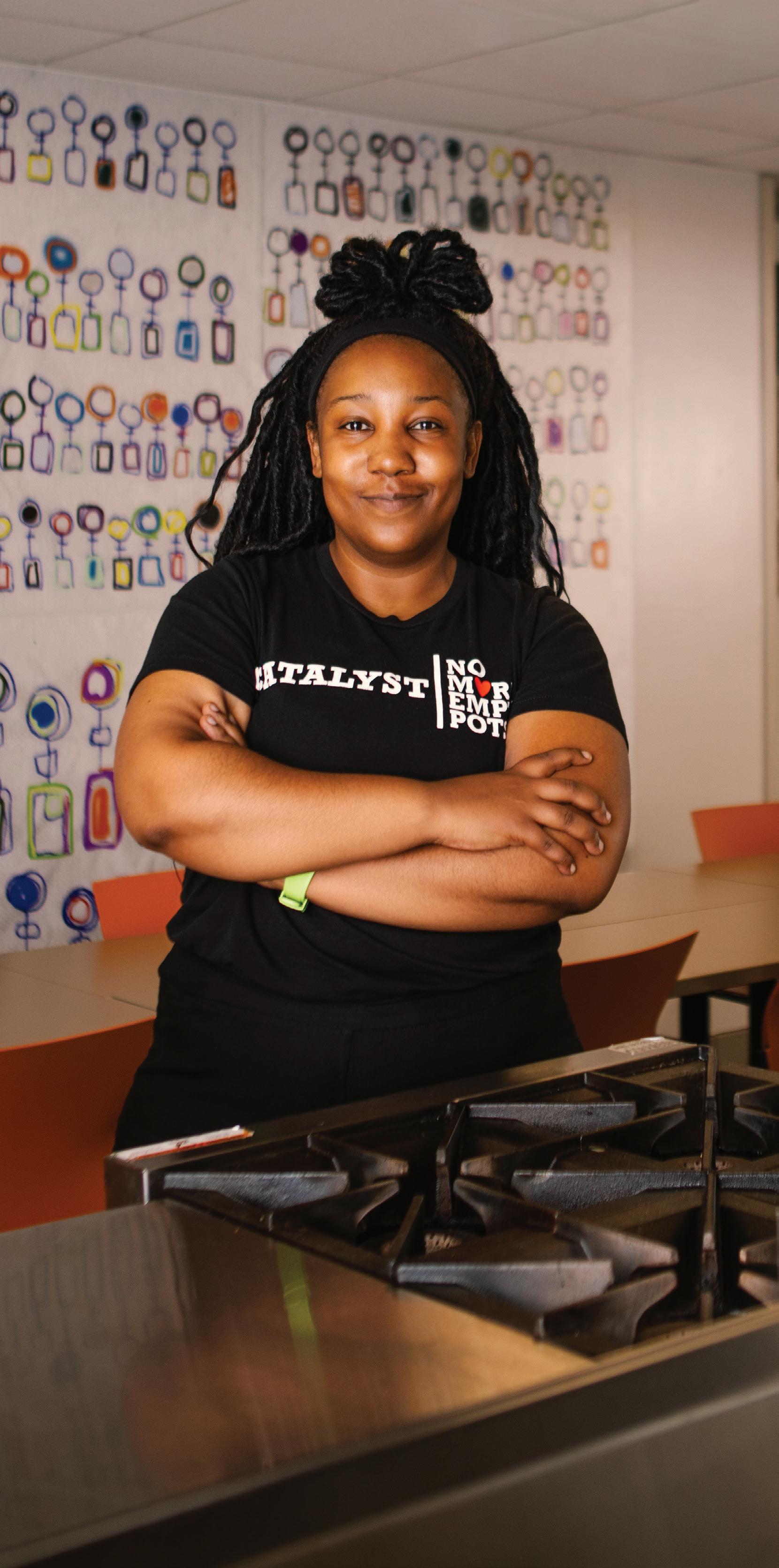
Talia McGill



